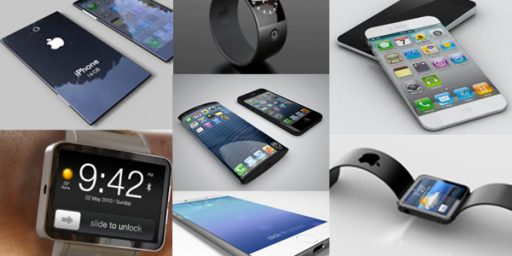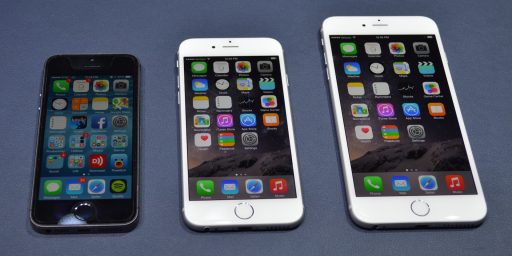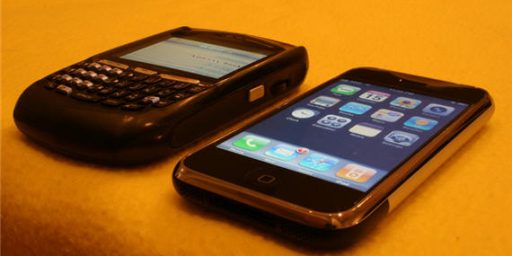Stop iPhone Tyranny Now!
Salon‘s Farhad Manjoo notes the fight of one brave lawmaker to end the impossible tyranny of Apple and AT&T over the Must Have Gadget of the Century, the indispensable iPhone.
Edward Markey, the Massachusetts Democrat who chairs the committee, began the affair by holding up the phone and hailing its “sheer brilliance and wizardry,” noting that “undoubtedly consumers will cherish this device as though it is a part of their family.”
But the iPhone, Markey said, “highlights both the promise and the problems of the wireless industry today.” The phone sells for full price, yet owners get essentially no rights over how to use it; the phone forces you to sign a two-year contract with poorly ranked AT&T service, at pain of a $175 early-termination fee. “Many consumers feel trapped having bought an expensive device or having been locked into a long-term contract with significant penalties for switching,” Markey said. And it’s not just iPhone owners. Nobody likes their cell provider; people are sick of the fees, they’re sick of the stringent contracts, they’re sick of the bad cell signal. But what are you going to do? There are four large cell carriers in the U.S. — AT&T, Verizon, T-Mobile and Sprint — and none has customers who are particularly happy.
Ezra Klein remarks, “It’s really rather remarkable how totally we let cell phone companies screw us over.”
Truly, this is a national tragedy. If only — if only — there were some way to escape this abuse at the hands of our corporate overlords.
Now, some of you are probably thinking, “But, James, you don’t have to sign a long-term contract with AT&T. And you don’t have to get an iPhone. Generations of Americans have gotten along without them. And, if nobody buys one, Apple will change their business model.”
Now you’re just talking nonsense. Didn’t you read what Markey said about “sheer brilliance and wizardry”?! Plus, as Manjoo points out, AT&T has a veritable gun to your head, forcing you to give up your rights to chose other companies:
Many people might consider this a good trade; get a free phone, sign a long-term contract. But as Chris Murray, an attorney at Consumers Union, pointed out at the House hearing last week, wireless companies don’t give customers a choice over whether they want to take this deal. You can’t offer to pay full price for a handset in exchange for a reduced early-termination fee and an unlocked phone — no major firm will let you do that. Indeed, in some instances carriers will charge you a fee even when they don’t offer you any break on the price of the phone. The iPhone is the primary exhibit: AT&T doesn’t subsidize the price of the phone, but you’re still locked to a single provider.
So, you see, if you don’t enter into a contract with them, agreeing to do some stuff you’d rather not do, they won’t enter into a contract with you and give you the stuff you want from them.
That’s pretty harsh. It reminds me of when I was 15 and joined the Columbia House Record Club. They sent me 13 albums for a penny. Then, they had the audacity to expect me to buy six more albums from them — at prices higher than Wal-Mart charges for them — over the next three years plus pay shipping and handling. Sure, I knew that going into the deal but all I could see was “13 albums for a penny.” The rest of the deal was not to my liking. Boy, was I steamed.
Now, sure, I could get the really cool phone and cough up the extra $175 and break the contract with AT&T so that I could get the far, far better cell phone service offered by other companies — where they let you transmit not only voice but also text via “satellite signals.” But, sheesh, who wants to do that? There oughta be a law!
UPDATE: Triumph thinks the last option unavailable because Apple has “locked” the phone to protect the exclusivity given AT&T. While not part of Markey’s discussion, Manjoo notes that issue later in his piece. Apparently, there are numerous ways around it.
Still, I’m not sure how this is different than the “proprietary” game that Sony played unsuccessfully with BetaMax and Apple has played very successfully with the iPod. Ultimately, people buy the product under the terms it’s being offered or they don’t. If the product is good enough, people will put up with it. If a suitable substitute exists, they don’t.
For the record: I don’t own an iPhone and have no plans to buy one anytime soon. I have had cell service with AT&T (mostly, under the Cingular name) for years. My two year contract is actually up and I’m going month-to-month for now.





Don’t they block the phone so you can’t use it with another provider?
I agree with you on this one.
I do find the whole locking and contracts annoying, but I do agree with the wireless companies’ argument that they have to recoup the investment in the phone.
Of course, there are plenty of non-contract wireless options–and, I gather, unlocked phones available for purchase at secondary dealers.
It’s funny how the wickedly evil Microsoft is skewered for this sort of tactic with Windows, Office, Internet Explorer, et al, but the sins of the saintly Apple are washed away due to their, well, their not being Microsoft, I guess.
It doesn’t help the cause of market economics when its most ideologically pure defenders make stupid claims that it doesn’t matter that there’s basically an oligopoly of 4, very bad, cell phone providers here. You might end up with legislative remedies which substantially overreach because you couldn’t bring yourself to tarnish your libertarian credibility here.
I’m sorry in what way is Apple interfering with other phone makers from operating on a cell network? In what way is Apple forcing users to go to extra trouble to use another phone on a cell network?
If Apple is evil, it is in an old testament way. They invoke lust and desire for their offering. When you see the iPhone, you don’t want it. You want to touch it, you want to caress it, you want to fondle it. In the end, you neeeed it even if you don’t need a cell phone. Even if you don’t have cell service in your town. That is an evil the devil could get behind. Not the Microsoft petty annoyance kind of evil but deep in the belly overwhelming lascivious lust.
To satisfy this deep yearning, you must sign a contract. One you can’t fiddle yourself out of. But also one that provides a useful service and doesn’t lead to eternal damnation. On the other hand, those who have had iPhone activation problems do describe their experience as a special kind of hell.
Think of AT&T as the mother-in-law you have to accept in order to get to spend your nights enjoying the delights of your beautiful bride.
My family and I live in a rural area and have one of the big four as our cell phone providers. Cell phone service is a huge step up from the local land line service we have. My main point is that the claim of “Nobody likes their cell provider…” is not entirely accurate. The fees are not unreasonable to us, and our reception has been great.
As to Apple and AT&T doing business together, I see that as their choice. In a free market economy we ought to respect that.
Imagine of the Beatle’s White album was only available through Columbia House (at above Walmart price, or course), and only if you signed a contract to buy 120 other CDs from them or pay a $175 termination fee. Sure you still don’t have to buy the album, but at least this way the analogy is a little closer (financially) to the iPhone deal.
Now imagine a Columbia House competitor is the only one that offers the newest Fallout Boy album, and again with the same contract. You want to listen to it? Sure, just pay Columbia House that $175, plus $20 for the new Album, and $2,400 in additional albums because of your new contract (or pay another $175 termination fee). Suddenly that new Fallout Boy album costs between $370 and $2,595.
JJ left off the very worst — that Apple is providing iPhones only to a certain socioeconomic class, namely “those who can afford to pay for them.”
Perhaps John Edwards will address this injustice when he’s President.
I’m not sure any wireless company will disallow a phone purchased from a third party, as long as that phone supports their network protocol. But with things like the iPhone, most of the functions are built on services proprietary to AT&T. So even if you took the iPhone to another carrier that used the same network protocol, all those fancy feature won’t work, just the phone and basic internet. For those interested in an alternative, the FIC Neo 1973 and OpenMoko offer most of the same features of the iPhone, without any of the vendor lock-in. http://wiki.openmoko.org/wiki/Neo1973
Most of the rest of the world use GSM phones that aren’t locked to any provider. Just buy a SIM card from that company and your phone works. If only we had that choice here.
I imagine I’d buy other albums.
Indeed, I have that sort of choice all the time. I want NFL Sunday Ticket. That’s available only via DirecTV via exclusive licensing arrangement. I also want FiOS. The best deal is one that includes television. I either have to decide between them or suck it up and buy both.
We finally broke down and bought a Blu-Ray to play high def DVDs. Some movie companies only make their movies available in high def on HD-DVD format, which is incompatible with Blu-Ray. And vice-versa.
It’s not optimal, to be sure. That’s how the people who own the rights to their products are choosing to sell them. As a result, they limit their market. That’s their call.
But let’s not pretend that it’s just automatically the best scenario because it happens to be the current state of affairs here. Otherwise, you play right into the hands of the true leftists who think the market is ALWAYS broken and should thus never be trusted.
I’m a believer in markets, not because I think they produce the optimal state of affairs in the near time — they seldom do — but because I think governmental attempts to fix things almost always create suboptimal conditions. Plus, there’s the whole “freedom” thing.
AT&T’s coverage sucks in some areas and there are surely people who would love to own an iPhone and use a different carrier. I think Apple should have chosen a different business model that would allow that. I just don’t think it’s any of Congress’ business.
Further, owning an iPhone is hardly an inalienable right. If you don’t want the strings that come with it, get a Blackberry or another PDA.
Sure, but let’s not pretend that this is one of those instances. The cell-phone situation in Europe and Asia seems far superior to ours. Pretending that this isn’t true (rather than admitting that it’s an exception to the rule that markets usually provide better outcomes than fiat regulation) makes people not believe the rule in general, which is far more damaging in the long-run than giving up one small point here.
I don’t know much about the Asian cell phone system although I’d be very surprised if it’s very good outside major metropolitan areas.
It’s true that Western Europe has superb coverage. Then again, the logistics there are much, much easier given population density. Putting together an effective network in a continental sized country with large areas that are sparsely populated is much harder.
It’s true, though, that fiat has its advantages for things like this. I live in a densely populated area and there are still dead spots owing to public resistance every time someone wants to put up a cell tower, even one totally hidden from view. Whether that’s a feature or a bug depends, I suppose, on your view of democracy.
JJ,
I wasn’t talking at all about coverage – and anyways, the major metro areas of the East Coast are pretty much a good analogue for Western Europe – roughly comparable density. This red herring is usually brought up when talking about transportation (as if everybody outside the northeast commonly spends our days driving across Montana instead of to/from work). One of these days, I’ll make a comparable map of both – but eyeballing serves just as well for most people.
I must be cynical; while I applaud the representative for bringing up the issue, and therefore inviting scrutiny of not just Apple / AT&T but the whole cellular pricing structure, I can’t help thinking “he wouldn’t have done that without there being something in it for him”. Besides looking out for his constituents, I mean.
Has congress really reached such a low ebb in my mind? Why, yes. Yes, they have.
I’m by no means an expert but at least in the case of China, they’ve blanketed the entire country with cell towers. I’ve heard an NPR reporter say that when he had a broken down vehicle in the middle of nowhere Gansu province, he pulled out his cell phone and got full strength signals, so was able to call the next town down the road and call for a repair crew. China and other developing countries are skipping the entire “landline” part of telecommunications infrastructure and going directly to 3G mobile service. It’s true that in many parts of the world they have better mobile service because they don’t have to maintain the legacy landline system.